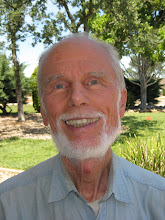Wednesday, June 24, 2009
Miles Stuart Compton, RIP
Stuart had been having severe stomach pain and later decided he wanted to go to the Emergency Room for treatment. I wound up spending the night with him there, not that he seemed to be very sick, but for a couple of other reasons. I don't entirely trust hospitals with older patients and Stuart had turned 80 just last week. I wanted to have a prolife advocate present if his condition became serious. And having just read "The Wind in the Willows," I had in mind the the loyalty of Mole and Rat to each other and to their friends. Jesus' words about visiting Him when he was sick also encouraged me. Consequently, I got to see the early summer sunrise when I finally left the hospital after 5:00 am.
But Stuart had a bad abdominal hernia ever since they removed part of his colon 6 or 8 years ago, and the doctor and the surgeon wanted to repair it. I discussed the risks of surgery with Stuart, but the hernia was troublesome and he wanted to get rid of it. So they repaired the hernia on Monday and I called him at the hospital that evening and Tuesday as I recall. We prayed Tuesday, but I talked with him only briefly because he was in a lot of pain.
Wednesday morning Stuart's immortal longings were suddenly and unexpectedly fulfilled. And this is a realistic way of understanding his death. For as Christians we do not sorrow as those who have no certainty about going to that place for which we all long, the kingdom of God where the Lord Jesus Christ rules and reigns.
Monday, June 22, 2009
On "The Wind in the Willows"
“‘It’s gone!’ sighed the Rat, sinking back in his seat again. “so beautiful and strange and new! Since it was to end so soon, I almost wish I had never heard it. For it has roused a longing in me that is pain, and nothing seems worth while but just to hear that sound once more and go on listening to it forever. No! there it is again!’ he cried, alert once more. Entranced, he was silent for a long space, spellbound.
“‘Now it passes on and I begin to lose it,’ he said presently. ‘Oh, Mole! The beauty of it!! The merry bubble and joy, the thin, clear, happy call of the distant piping! Such music I never dreamed of and the call in it is stronger even that the music is sweet! Row on, Mole, row! For the music and the call must be for us.’
“The Mole, greatly wondering, obeyed. ‘I hear nothing myself,’ he said, ‘but the wind playing in the reeds and rushes and osiers.’
“The Rat never answered, if indeed he heard. Rapt, transported, trembling, he was possessed in all his senses by this new divine thing that caught up his helpless soul and swung and dandled it, a powerless but happy infant, in a strong sustaining grasp” (114, "The Wind in the Willows).
Well, is Grahame spoiling the Pagans of Pan, the “Piper at the Gates of Dawn’? I don’t know, but no matter. His masterful evocation of the ineffable longing for another world would be for C. S. Lewis a clue and invitation to seek that other, unknown world for which we long.
As an animal fable, the four main characters, Toad, Rat, Mole and Badger, represent the four humors or personality types of Sanguine, Melancholic, Phlegmatic and Choleric. Toad is certainly the Sanguine (‘expressive”) and Badger the Choleric (a leader who gets things done). I leave as an exercise Rat and Mole's classification although I think I've figured it out. But Grahame’s characters are like real people in that they sometimes act out of a humor other than their dominant one. For example, Mole's seizing the oars from Rat (and capsizing their boat) on their first outing is out of character for him (but might be expected of Toad).
What is remarkable is Grahame's evocation of those immortal longings we all have for something beyond our experience of this world, longings that tell us we are made for another world and that Lewis describes in his "The Weight of Glory." Grahame uses the Pagan Piper Pan to subcreate this experience in Rat and Mole during their mission of mercy to find the missing baby otter. The question I pose is whether Grahame is consciously using Pan for a Christian purpose or just describing the universal experience of longing for our home country of Paradise, the kingdom of God where the Son of God rules and reigns.
